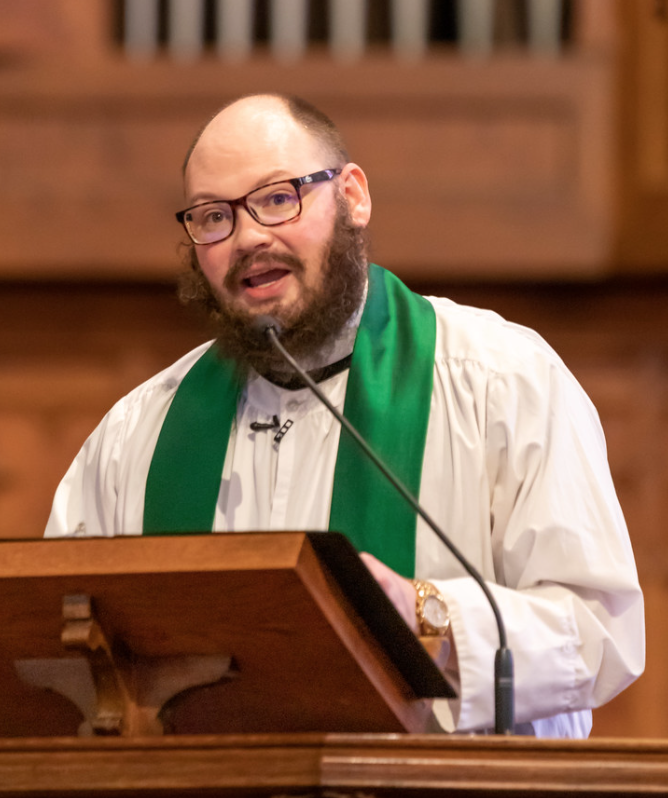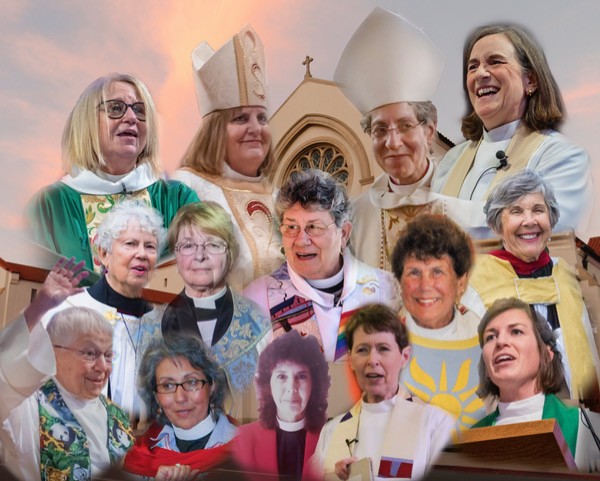
Rev. Cn. Richard Hogue Jr.
Happy Comic Con Sunday, everyone! Thank you to those of you who showed up in your cosplay outfits. [Shout outs]
We all have favorite stories, franchises of entertainment, and characters within them. In the church, we have saints, and while we don’t hold entertainment conventions dedicated to them, we do set aside days in the calendar to remember them and to retell their stories. Today, we’re remembering the Philadelphia Eleven, who were the first women ordained as priests in the Episcopal Church on, Monday, July 29th, 1974. It was no ordinary affair, and it was no ordinary story. There wasn’t a bombastic score to accompany some amazing battle scene a la an Avengers or Marvel movie, no denouement to conclude the long series of events that led to the moment. It was neither easy nor over, as the last word on women’s ordination wasn’t issued until 1976, when the General Convention of the Episcopal Church voted to allow women to become priests and bishops. That was still not the end of the struggle for women’s ordination in many dioceses, and while I cannot go into great detail right now, I’ll leave a link to an article examining their struggles in my sermon notes for the online edition which you will find on our website. [1]
Nonetheless, it was momentous, and it changed the world, as women continue to lead in our church, and break old glass ceilings all the time in the secular world. Regardless of one’s thoughts on the current political climate, the wide embrace of Vice President Kamala Harris—a biracial woman—by a major political party as a presidential nominee stands in stark contrast to the all male faces and voices of the presidency since the United States became a nation. The Philadelphia Eleven, Kamala Harris, and countless other women in public and private life challenge the patriarchal perceptions of what leadership looks like in sacred, secular, and mundane places.
Sometimes, to embrace change or the unknown, we need stories to boost our sense of possibility. Any change, even for the best reasons, is often scary and fraught as we advance into the unknown. Stories can grant us courage and confidence that even amid the toss and tumult of the unfamiliar we can find a better future than the past we are leaving behind. The most palpable recent use of this formula for me was in George Miller’s Furiosa: A Mad Max Saga. Anya Taylor-Joy plays the titular Furiosa, whose story starts with utter tragedy, goes through grief to rage, but she ultimately plants a seed of hope in an otherwise hopeless post-apocalyptic world. Her character in this, and the 2015 film Mad Max Fury Road, in which Charlize Theron played Furiosa, exemplifies the mightiness of a woman who knows the powers that be are not lifegiving, and pursues a different course in search of a better world. Through her own blood, sweat, and tears, she gives birth to new possibilities even as she struggles with patriarchal domination. If you enjoy fighting for hope amid despair, then Furiosa is a powerful feminine icon to hold close. She is my personal favorite heroine for our current era.
Likewise, fans of Star Trek: Voyager, know the excellence of Captain Kathryn Janeway, played by Kate Mulgrew, who for seven years guides an Odyssey like journey for the crew of the USS Voyager through the vast unknown of space without any aid or reinforcement, separated by most of the galaxy from anything close to the familiar as they try to find their way home. While it may not be my favorite Star Trek show overall, one cannot argue that among the pantheon of Star Trek captains, Janeway is the most successful given the circumstances with which she led.
Within the Marvel Cinematic Universe, there are several female figures to look up to, but my personal favorite among them is Shuri, played by Letita Wright, sister to T’Challa, the king of Wakanda, who assumes the role of the Black Panther in the wake of her brother’s death in Black Panther: Wakanda Forever. She defends the people of Wakanda, copes with her grief, and exemplifies selflessness in the face of her own self-doubt.
Each of these heroines may be fictional, but point to the need for feminine leadership in the face of the fear of change and newness. Each of them live fully into the change, even as grief, self-doubt, and their own fears fight against them. Nevertheless, these heroines persisted. And so it was with the Philadelphia Eleven, brave women who heard their calling clearly and moved forward even as the world tried to push them back. Like the midwives of Egypt who saved Hebrew children from death and the women who witnessed the empty tomb that first Easter morning, their actions define the world to come even if they weren’t taken seriously in their own community.
And so, here we are today. St. Paul’s has its own array of women priests and other leaders who have changed the complexion of our cathedral community and our diocese, like our own Bishop Susan. In my own life, my mother is a deacon. The Rev. Brenda Sol, rector of St. Andrew’s, Encinitas, was the mentor I needed to grow into my role as a priest and she nurtured my ministry in ways I probably still don’t fully comprehend. And of course, I am grateful to Dean Penny for having brought me on board here at our beloved cathedral, and who allows me to do what I feel must be done to continue building the legacy of this community. Each of these women, from fictional to real life figures, embody the Holy Spirit’s movement to a new present reality, even as some struggle with the unknown. Humanity will never be in a place where there aren’t challenges, and there is nothing so constant as change, but if we accept the risks of the new, we may heal the scars of the past. Don’t underestimate the power of stories, or women, or of the life-giving Spirit. To God be the glory!


